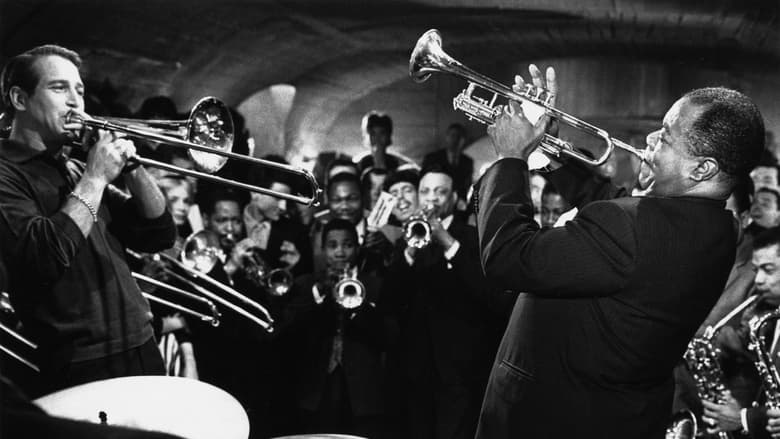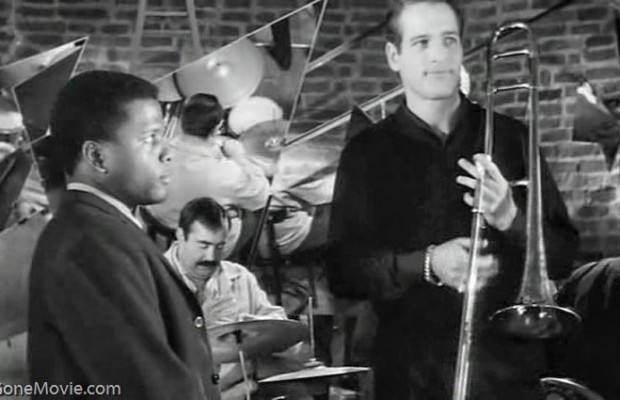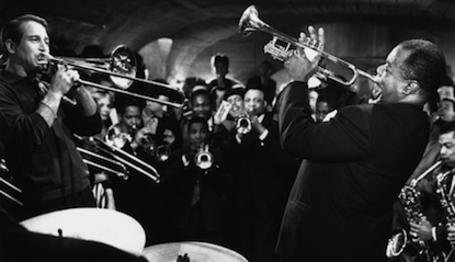← Back to Reviews

in
Paris Blues
Paul Newman and Joanne Woodward definitely tried something a little different for their fourth onscreen pairing. 1961's Paris Blues is a dark musical melodrama that quietly examines the passion inside musicians and how nothing or no one can ever become between a real musician and his music.

Ram Bowen (Paul Newman) is a trombone player and sax player Eddie Cook (Sidney Poitier) are American musicians who are living in Paris, convinced this is the only place where they can play the kind of music they want to and make a living at it as well. The guys heads are turned with the arrival of a pair of American tourists named Lillian Corning (Joanne Woodward) and Connie Lampson (Diahann Carroll) who are initially drawn to our heroes because of their musical passion, but make the fatal mistake off trying to manipulate the guys into being what they want them to be.

This on the surface simplistic story takes on an air of originality thanks to the inventive atmosphere that director Martin Ritt drapes the story in. Ritt creates an intoxicating setting for this story, setting it in the most romantic city in the world and using the inspired decision to film in black and white, which actually makes the City of Lights look just as appealing as Gene Kelly made it look in An American in Paris. The other primary contributor to the atmosphere is some of the most glorious jazz and blues music I have ever heard, under the skillful direction of Duke Ellington, the music, as it did in the 1977 musical New York New York, almost becomes another character on the canvas.

Jack Sher and Irene Kamp's screenplay is an effective look at the delicate ego of the musician and how they clamor for the love and respect for their work and wont accept anything else. The through line of this story comes into focus pretty quickly and never strays...that is the fact that nothing can come between a true musician and his music, not even a woman. These themes are effectively illustrated when an important music publisher asks to see Ram after hearing some of his music and Ram can't accept the fact that the guy doesn't immediately proclaim him a musical genius. Of course, the casting of Poitier and Carroll allows the story to touch on racism, even if the touch is light. We even get a glimpse at a jazz guitarist and good friend of Ram's who seems to be destroying his career because of his addiction to cocaine.

Ritt also gets solid performances from his stars. Newman lights up the screen in a slightly altered version of Hud or Eddie Felson, except that this guy plays trombone (Newman's trombone solos were performed by Murray McEachern) and Woodward, as she always does, brings a texture to the role of Lillian that is not in the screenplay. Poitier's sensitive yet explosive Eddie Cook is an acting class in itself (his sax solos were performed by Paul Gonsalves) and he creates a nice chemistry with Carroll as the slightly manipulative Connie. It's not extraordinary filmmaking but Ritt, his star quartet, and the great music made this one worth investing in.
Paul Newman and Joanne Woodward definitely tried something a little different for their fourth onscreen pairing. 1961's Paris Blues is a dark musical melodrama that quietly examines the passion inside musicians and how nothing or no one can ever become between a real musician and his music.

Ram Bowen (Paul Newman) is a trombone player and sax player Eddie Cook (Sidney Poitier) are American musicians who are living in Paris, convinced this is the only place where they can play the kind of music they want to and make a living at it as well. The guys heads are turned with the arrival of a pair of American tourists named Lillian Corning (Joanne Woodward) and Connie Lampson (Diahann Carroll) who are initially drawn to our heroes because of their musical passion, but make the fatal mistake off trying to manipulate the guys into being what they want them to be.

This on the surface simplistic story takes on an air of originality thanks to the inventive atmosphere that director Martin Ritt drapes the story in. Ritt creates an intoxicating setting for this story, setting it in the most romantic city in the world and using the inspired decision to film in black and white, which actually makes the City of Lights look just as appealing as Gene Kelly made it look in An American in Paris. The other primary contributor to the atmosphere is some of the most glorious jazz and blues music I have ever heard, under the skillful direction of Duke Ellington, the music, as it did in the 1977 musical New York New York, almost becomes another character on the canvas.

Jack Sher and Irene Kamp's screenplay is an effective look at the delicate ego of the musician and how they clamor for the love and respect for their work and wont accept anything else. The through line of this story comes into focus pretty quickly and never strays...that is the fact that nothing can come between a true musician and his music, not even a woman. These themes are effectively illustrated when an important music publisher asks to see Ram after hearing some of his music and Ram can't accept the fact that the guy doesn't immediately proclaim him a musical genius. Of course, the casting of Poitier and Carroll allows the story to touch on racism, even if the touch is light. We even get a glimpse at a jazz guitarist and good friend of Ram's who seems to be destroying his career because of his addiction to cocaine.

Ritt also gets solid performances from his stars. Newman lights up the screen in a slightly altered version of Hud or Eddie Felson, except that this guy plays trombone (Newman's trombone solos were performed by Murray McEachern) and Woodward, as she always does, brings a texture to the role of Lillian that is not in the screenplay. Poitier's sensitive yet explosive Eddie Cook is an acting class in itself (his sax solos were performed by Paul Gonsalves) and he creates a nice chemistry with Carroll as the slightly manipulative Connie. It's not extraordinary filmmaking but Ritt, his star quartet, and the great music made this one worth investing in.
